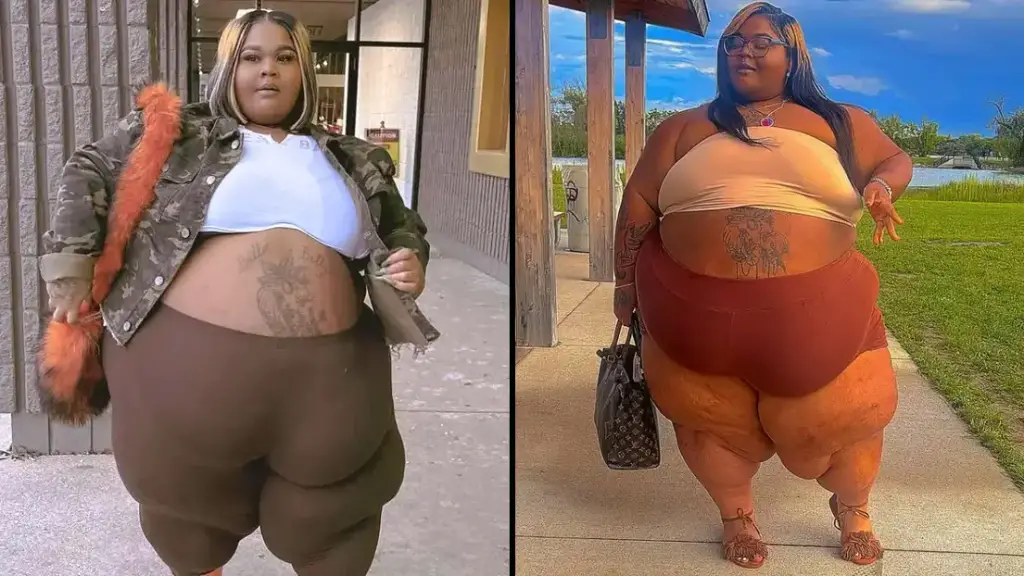A shocking incident has sparked controversy as a woman has filed a lawsuit against Lyft, claiming that a driver denied her service based on her body size and refused to let her enter his vehicle.
The woman at the center of the case is rapper Dank Demoss, whose real name is Dajua Blanding. She has taken legal action against the ride-hailing company following an upsetting encounter that took place in Detroit, Michigan.
The ordeal gained widespread attention after Blanding posted a video of the alleged incident on social media, where it quickly ignited intense discussion, with many users voicing outrage and debating whether the driver’s refusal was a form of discrimination or a personal choice.

Viral Video Exposes Controversial Exchange Between Passenger and Driver
Blanding, who was expecting a routine ride, never anticipated that the trip would turn into a frustrating and humiliating experience. The video, which has since spread across various platforms, captures the moment she confronted the Lyft driver, who was behind the wheel of a Mercedes-Benz sedan.
In the footage, the driver expresses doubts about whether Blanding would physically fit into the back seat of his vehicle, saying:
“I got no space at all, my car is small.”
Blanding, taken aback by the remark, immediately counters his claim, firmly stating:
“I can fit in this car.”
However, despite her insistence, the driver refuses to budge. He stands by his statement, telling her:
“No, believe me, you can’t, so… I’m sorry.”
As the conversation continues, Blanding questions what will happen to the money she already paid for the ride, asking whether she will be reimbursed. The driver explains that he will cancel the trip, ensuring that she receives a refund.
But the situation escalates when Blanding directly confronts him about his refusal. She asks point-blank if he is declining her service because of her size. Without hesitation, the driver responds:
“Yeah, you need to order a bigger car.”

As if the situation wasn’t strange enough, the driver also offers an unusual explanation, claiming that his tires were “very tired”, implying that they might not be able to handle the additional weight.
Confused and frustrated, Blanding challenges this reasoning, asking:
“What I got to do with your tires?”
Public Outrage: Rapper Calls Out Lyft for Alleged Discrimination
Following the incident, Blanding took to Instagram, sharing the video along with a passionate message directed at Lyft. She called out the company for what she perceived to be a case of weight-based discrimination, making it clear that she felt deeply wronged by the experience.
In the caption of her post, she wrote:
“@lyft what y’all got to say about this? Y’all driver discriminated against me. I JUST FEEL LIKE Y’ALL TREAT BIG PPL LIKE S** LIKE WE DON’T BELONG HERE.”*
Her post resonated with many users, sparking discussions about body shaming, discrimination, and the rights of plus-size individuals when using ride-hailing services.
Legal Action: Blanding Takes Lyft to Court for Alleged Bias
Refusing to let the issue go unresolved, Blanding has now secured legal representation and is officially moving forward with a lawsuit against Lyft. She claims that the driver’s actions were discriminatory, and she is determined to seek justice.
In an interview discussing the emotional toll of the incident, Blanding revealed how deeply hurt she was by the experience. She explained:
“I’ve been in cars smaller than that. I just want them to know that it hurt my feelings.”
Attorney Speaks Out: Compares Case to Racial and Religious Discrimination
One of Blanding’s attorneys, Jonathan Marko, spoke out about the case, emphasizing the legal weight of the issue. He pointed out that Michigan is the only U.S. state with explicit laws that prohibit discrimination based on weight, making the case particularly significant.
“I knew that it was illegal and I knew that it was wrong,” Marko said.
He went on to make a powerful comparison, arguing that the situation was no different than if a driver had refused to transport someone based on their race or religion.
“It would be no different than a driver pulling up and saying, ‘I don’t want to have Black people in my car’ or ‘I don’t want to have Christians in my car.’ It’s the same, under the law, it’s the same.”
Lyft Responds: Company Denies Any Form of Discrimination
As the controversy gained momentum, Lyft was compelled to issue a statement addressing the matter. In a formal response to the media, the company reaffirmed its commitment to equal treatment and anti-discrimination policies.
The official statement read:
“We unequivocally condemn all forms of discrimination. We believe in a community where everyone is treated with equal respect and mutual kindness. Our community guidelines and terms of service explicitly prohibit harassment or discrimination.”
However, despite this response, many remain skeptical about whether Lyft will take further action regarding the incident. Some believe that more concrete steps need to be taken to ensure that such situations do not happen again in the future.

A Larger Conversation: The Fight Against Weight Discrimination
Beyond the lawsuit, this case has reignited an important discussion about how plus-size individuals are treated in society—especially in public services like ride-sharing, airlines, and public transportation. Many argue that weight discrimination is often overlooked, despite being a real and damaging form of bias.
With Michigan being the only state that explicitly prohibits weight discrimination, activists and advocates are now pushing for broader legal protections to prevent similar incidents from happening elsewhere in the U.S.
As Blanding’s case moves forward in court, it remains to be seen how Lyft will handle the legal battle—and whether this lawsuit will set a new precedent for weight discrimination cases in the ride-hailing industry.